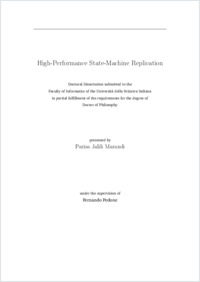High-performance state-machine replication
- Jalili Marandi, Parisa
- Pedone, Fernando (Degree supervisor)
-
08.09.2014
154 p
Thèse de doctorat: Università della Svizzera italiana, 2014
English
Replication, a common approach to protecting applications against failures, refers to maintaining several copies of a service on independent machines (replicas). Unlike a stand-alone service, a replicated service remains available to its clients despite the failure of some of its copies. Consistency among replicas is an immediate concern raised by replication. In effect, an important factor for providing the illusion of an uninterrupted service to clients is to preserve consistency among the multiple copies. State-machine replication is a popular replication technique that ensures consistency by ordering client requests and making all the replicas execute them deterministically and sequentially. The overhead of ordering the requests, and the sequentiality of request execution, the two essential requirements in realizing state-machine replication, are also the two major obstacles that prevent the performance of state-machine replication from scaling. In this thesis we concentrate on the performance of state-machine replication and enhance it by overcoming the two aforementioned bottlenecks, the overhead of ordering and the overhead of sequentially executing commands. To realize a truly scalable system, one must iteratively examine and analyze all the layers and components of a system and avoid or eliminate potential performance obstructions and congestion points. In this dissertation, we iterate between optimizing the ordering of requests and the strategies of replicas at request execution, in order to stretch the performance boundaries of state-machine replication. To eliminate the negative implications of the ordering layer on performance, we devise and implement several novel and highly efficient ordering protocols. Our proposals are based on practical observations we make after closely assessing and identifying the shortcomings of existing approaches. Communication is one of the most important components of any distributed system and thus selecting efficient communication patterns is a must in designing scalable systems. We base our protocols on the most suitable communication patterns and extend their design with additional features that altogether realize our protocol's high efficiency. The outcome of this phase is the design and implementation of the Ring Paxos family of protocols. According to our evaluations these protocols are highly scalable and efficient. We then assess the performance ramifications of sequential execution of requests on the replicas of state-machine replication. We use some known techniques such as state-partitioning and speculative execution, and thoroughly examine their advantages when combined with our ordering protocols. We then exploit the features of multicore hardware and propose our final solution as a parallelized form of state-machine replication, built on top of Ring Paxos protocols, that is capable of accomplishing significantly high performance. Given the popularity of state-machine replication in designing fault-tolerant systems, we hope this thesis provides useful and practical guidelines for the enhancement of the existing and the design of future fault-tolerant systems that share similar performance goals.
- Language
-
- English
- Classification
- Computer science and technology
- License
-
License undefined
- Identifiers
-
- RERO DOC 213291
- URN urn:nbn:ch:rero-006-113210
- ARK ark:/12658/srd1318541
- Persistent URL
- https://n2t.net/ark:/12658/srd1318541
Statistics
Document views: 349
File downloads:
- Texte intégral: 349
